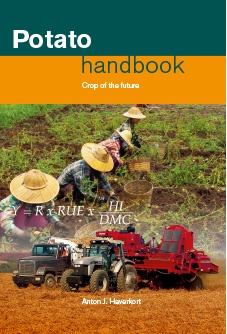
There are several physiological traits that Potato-breeders look for when it comes to tuber characteristics. Tuber initiation is the moment that the tubers are formed at the stolons. This takes place relatively early, about 10 days after emergence or late, up to one month.
This is variety-dependent, but it also depends on the environment: longer days and high temperatures delay the onset of tuber formation. Tubers are dormant as of tuber formation, initially dormancy is absolute, towards sprouting dormancy becomes relative and is temperature dependent: higher temperatures reduce its length.
Dormancy period
For breeding screening purposes the dormancy period of the tuber is defined as the time between tuber maturity and the appearance of sprouts. This period ranges from short to long as sprouting occurs shortly after tuber maturity in some genotypes or only many months later in other ones. In equatorial tropical highlands, where more than one potato crop is grown per year, a short dormancy period of one or two months is required. In temperate climates with a long winter, seed potato crops are stored for some eight months, up to ten months. In such conditions, a long dormancy period is advantageous for the storage of seed and for ware potatoes. Scoring dormancy of different genotypes in different years is an exercise in comparison. Each growing season is different with variation in planting and harvest time and temperatures during growth. This, combined with different storage conditions every storage season leads to significant differences of non-varietal origin. Comparing the appearance of the sprouts of the new clones week after week with a set of standard varieties of known lengths of the dormancy period, allows the allocation of a relative score between 1 (dormant) and 9 (many cm long sprouts).
Want to learn everything about the potato? Our handbook is a Global Potato university in 1 book!
Buy your copy today and get a 1 year free subscription to Potato world magazine.

